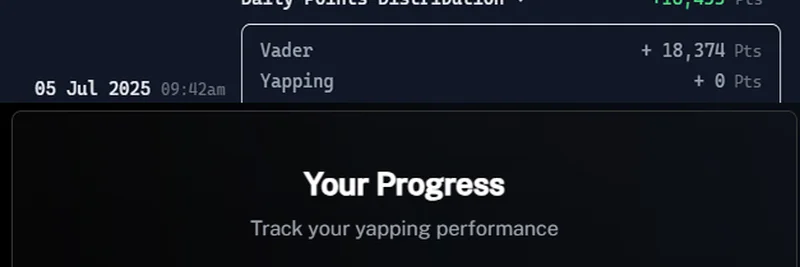Hey there, crypto enthusiasts! If you’ve been keeping an eye on the Virtuals.io platform, you might have noticed some buzz around the Vader points system lately. A recent tweet from Evans Web3 Dev has sparked a lively discussion about inflation control and its impact on Yappers—those active community members earning points through engagement. Let’s dive into the details and unpack what’s going on!
The Tweet That Started It All
On July 6, 2025, Evans shared a couple of screenshots from the Points History dashboard, highlighting a puzzling trend. Check out the images below:
On July 5, Evans raked in 18,433 points for a top #40 rank, with a solid 18,374 points from Vader and a small boost from Yapping. Fast forward to July 6, and despite climbing to #37, the total dropped to 15,879 points. That’s a noticeable dip! The Daily Weight also shifted from 0.5533% to 0.5679%, suggesting a slight increase in influence, yet the rewards tell a different story.
What’s Causing the Inflation Concerns?
Evans didn’t hold back, calling out the platform with a pointed question: “So this is what inflation control looks like, @virtuals_io?” The core issue? It seems the platform is tweaking the points distribution to manage inflation, but it’s hitting Yappers hard. Here’s the breakdown:
- Reduced Rewards: Going from 18.3k to 15.8k points in a single day, despite a better rank, feels like a punch to the gut for active users.
- Dev Wallets Dominance: Evans hints at a bigger problem—developer wallets are allegedly farming “tens of millions” of points, while Yappers only get 2.18% of the daily distribution. That’s a tiny slice of the pie!
- Impact on Mindshare: Lowering rewards for Yappers could discourage participation, which is the lifeblood of any decentralized finance (DeFi) ecosystem.
This has left many wondering if the system is unfairly skewed against smaller accounts. In a follow-up tweet, Leo Hoang chimed in, sharing a table that shows how long it takes to break even on staked $VADER—spoiler alert, it’s a long wait for those with modest stakes!
Why This Matters to the Crypto Community
Virtuals.io is built around a society of AI agents that engage in onchain commerce, with Vader as a key liquidity protocol. Yappers play a crucial role by boosting engagement and earning points that could translate to rewards. But if inflation control comes at the expense of these contributors, it could hurt the platform’s growth. As Evans put it, “We’re not the problem!”—a sentiment echoed by others in the thread.
For blockchain practitioners, this is a reminder of how delicate reward systems can be. Inflation in crypto isn’t new—think of how Bitcoin adjusts its supply with halving events—but managing it in a points-based system tied to human effort adds a unique twist. If dev wallets are hoarding points, it might erode trust, which is the foundation of any Web3 project.
What’s Next for Virtuals.io and Yappers?
The thread shows a community divided but hopeful. Some, like Emma | Amalie, have been advocating for small accounts for weeks, facing backlash but standing firm. Others, like Crypto Arcadex, are optimistic that Virtuals.io will address these issues soon. The mention of the #WACH leaderboard by Cryptozemoon suggests there’s still excitement around active participation—just not at the current reward rate.
For now, it’s a waiting game. Will Virtuals.io tweak the algorithm to balance inflation and fairness? Could the reliance on metrics like ARBUS and KAITO (as noted by Boda911) be adjusted to level the playing field? As someone who’s tracked crypto trends for years, I’d say the community’s voice will be key here. Stay tuned to meme-insider.com for the latest updates!
Final Thoughts
This Vader points saga is a fascinating case study in crypto economics. It’s not just about numbers—it’s about building a system where everyone, from big devs to small Yappers, feels valued. If you’re staking $VADER or yapping for points, keep an eye on how this unfolds. Got thoughts? Drop them in the comments below—we’d love to hear from you!



